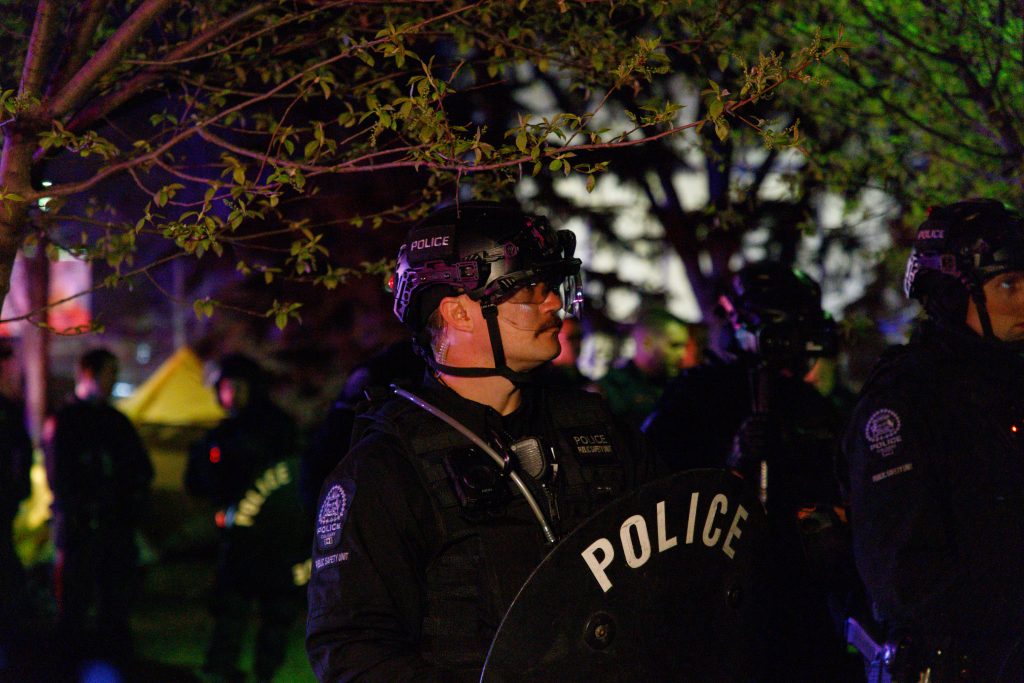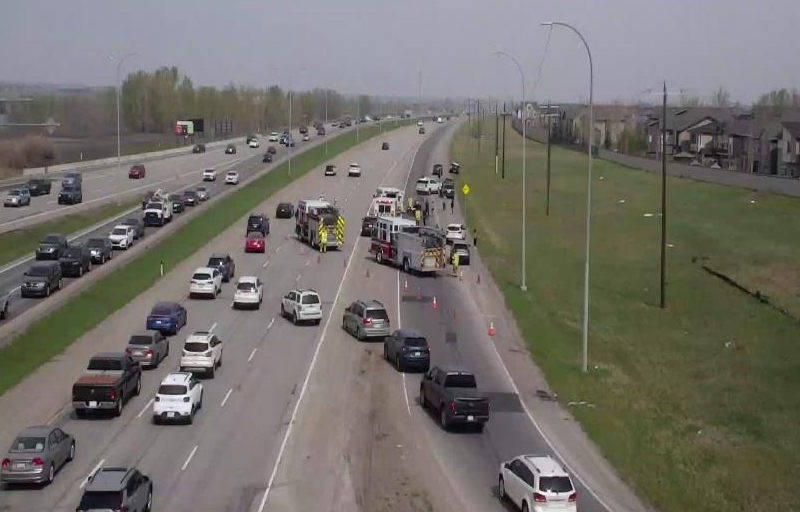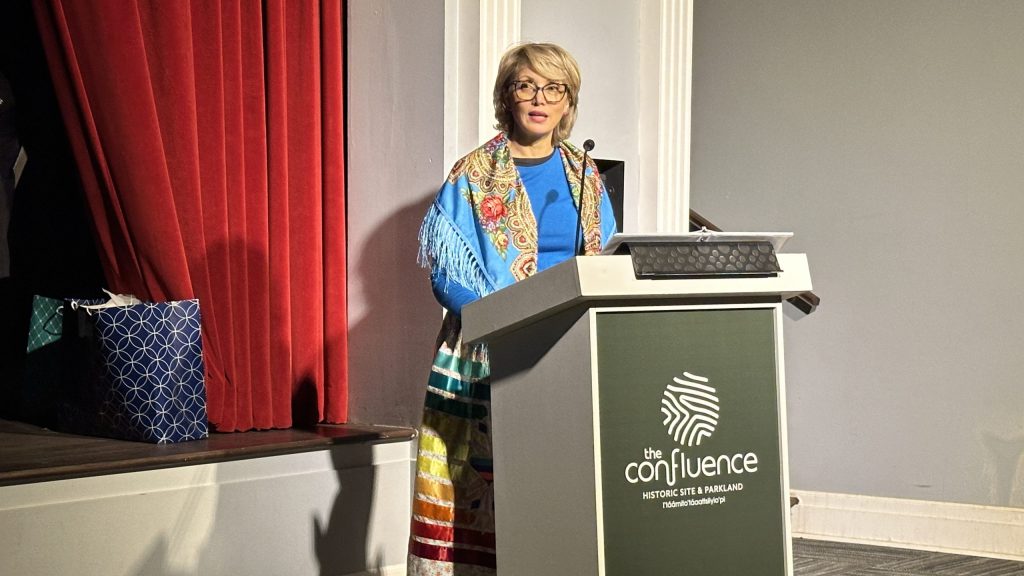Canada’s federal leaders face off in feisty English-language debate
Posted Oct 7, 2019 5:47 pm.
Last Updated Oct 8, 2019 6:47 am.
GATINEAU, QUE. – Verbal sparring has been heated as federal leaders square off in the English language debate.
The debate kicked off with questions on foreign policy and international division, and how best to defend Canadian interests in a chaotic world.
Liberal Leader Justin Trudeau has the first word, saying his government has invested in Canadians in order to bolster their confidence in their place in the world. People’s Party of Canada Leader Maxime Bernier says his party puts “Canada first.” Conservative Leader Andrew Scheer briefly committed to defending Canadian interests abroad and supporting free trade before rapidly turning to a more personal critique of Trudeau, calling him a “phoney” and a “fraud.”
Green party Leader Elizabeth May says global leadership is needed on climate, while Bloc Québécois Leader Yves-François Blanchet argues for a more modest approach, citing the arrest of Huawei executive Meng Wanzhou as a mistake for a country with “tiny biceps.”
Conservative Andrew Scheer says Bernier is looking for retweets from the darkest corners of the web #cdnpoli #CanadaDebates2019 #elxn43
— Cormac Mac Sweeney (@cmaconthehill) October 7, 2019
Bernier also responds to a follow up question on his controversial tweets by saying he supports a diverse Canada but advocating for reduced immigration.
Immigration
The first major back-and-forth between the leaders in tonight’s debate is on Bernier’s position on reducing immigration.
Bernier is attacked from all sides, though he maintains he supports reasonable immigration and protection of Canadian values. Scheer – whose party is at the greatest electoral risk from a successful Bernier – advocates for a “fair, orderly and compassionate” immigration system while accusing Bernier of searching for support from unsavoury corners of Canadian society.
The discussion is heated on all sides, with Bernier frequently breaking in to interrupt the other leaders. Trudeau, speaking last on the issue, uses the opportunity to take a dig at Scheer, saying Bernier’s role on the stage tonight is to say publicly what Scheer believes privately.
Moving rapidly, the debate turns to leadership at home and how the federal government will co-operate with provinces, an important issue particularly as it relates to climate change.
Bill 21
Moving from controversial issue to controversial issue, the second segment of the debate begins with a discussion of Quebec’s secularism law, Bill 21, which bans the wearing of religious symbols by many public servants.
The question goes to Singh, who says he is obviously against Bill 21 because of his own heritage and beliefs.
Each federal leader has had a similar position on the issue, noting to various degrees their opposition to the bill but most refusing explicitly to commit the federal government to joining a court challenge against it.
Singh and Bernier battle over whether or not the people's party leader should even be on the stage. Singh says Bernier incites hatred, Bernier says that's not true and Singh just wants to silence voices he disagrees with #cdnpoli #elxn43 #CanadaDebate2019
— Cormac Mac Sweeney (@cmaconthehill) October 7, 2019
Scheer and May both commend Singh for his handling of issues of race and discrimination throughout the campaign, a reference to his reaction to the revelations that Trudeau appeared in blackface multiple times in the past.
Trudeau notes he is the only leader who has left the door ajar to intervening in the court challenge, criticizing Singh for not acting on the NDP leader’s professed convictions.
Singh counters that the fight against Bill 21 is a continuation of his life’s experience, before turning to a denunciation of Bernier’s presence on the stage.
Singh jumps in with a joke. Says Trudeau and Scheer are arguing over who is worse #cdnpoli #elxn43 #CanadaDebates2019
— Cormac Mac Sweeney (@cmaconthehill) October 7, 2019
Indigenous Issues
In a reprise of an early-campaign clash over the rights of Indigenous people, May and Scheer argue about how consultation on major projects must be conducted.
May says “free, prior and informed consent” must be respected, while Scheer questions the practicality of such a system.
Trudeau says Scheer would bring a continuation of the attitudes of Stephen Harper, while Scheer says he has “nothing to learn” from Trudeau on working with Indigenous Peoples.
On environmental issues, Green Party @ElizabethMay‘s says to Liberal @JustinTrudeau climate leaders don’t buy pipelines. Trudeau says Canada needs a workable plan. Maxime Bernier says Trudeau and Scheer are the same on climate change, Trudeau calls it offensive #elxn43 #cdnpoli
— Cormac Mac Sweeney (@cmaconthehill) October 8, 2019
The discussion morphs quickly away from Indigenous rights and toward provincial jurisdiction, before Singh attempts to bring it back, discussing a recent decision from the Canadian Human Rights Tribunal on compensation for First Nations children harmed by on-reserve child welfare services.
Singh says Trudeau is appealing that decision, saying Trudeau did everything he could to keep SNC-Lavalin out of a courtroom but everything to challenge Indigenous children in one.
A question on the United Nations Declaration on the Rights of Indigenous People receives broad support from most leaders, perhaps most notably from Blanchet, who expresses a strong support for a nation-to-nation relationship.
Income inequality
Debating income inequality, Justin Trudeau once more goes to his record but says he is moving forward with an increase of the Canada Child Benefit and easier repayment of student debt.
Bernier promises to balance the budget within two years without cutting services, saying Canada’s national credit card is full.
Singh argues the question of inequality is not academic for Canadians, accusing Trudeau of not following up on his “nice words,” while saying an NDP government would ask wealthy Canadians to pay more to help working families.
Scheer argues Trudeau is out of touch and says the Liberal leader has attacked small businesses, whereas Scheer would encourage entrepreneurs.
A question on equalization payments goes to Blanchet, who proposes a new scheme in which payments would be allocated to provinces based on their contribution to the fight against climate change.
Trudeau says the existing system is imperfect, but it safeguards equality of opportunity and binds the country together – before he accuses Blanchet of trying to pull the country apart through his sovereigntist beliefs.
Environment
Each leader lauds his or her own climate plans while criticizing Trudeau for either his lack of action or allegedly ineffective policies.
May says the only way to measure the success of a policy is whether it holds global warming to safe levels. Trudeau says we must move faster, calling his plan “reasonable” and “doable,” while criticizing the opposition of some right-leaning premiers to climate change policies, specifically the federal carbon tax.
Bernier simultaneously criticizes May for a “radical” plan that would break the Canadian economy and Trudeau for a plan that would not meet Canada’s Paris Accord commitments.
Singh also takes aim at Trudeau, asking why Canadians should trust the Liberals to follow through on their commitments, and denies a counterattack from Trudeau who says the NDP support the construction of an oil refinery in Alberta.
May and Trudeau confront one another, with the Green leader saying she hopes Trudeau does not win a majority because he cannot be trusted to deliver on his climate promises.
Equalization payments
May says Blanchet’s equalization scheme would put too much of a burden on provinces like Alberta, which she says must invest the most to transition to a green economy.
Blanchet wields a question in the open debate segment, and aims it at Scheer, asking Scheer once more about his position on Bill 21.
Scheer says his stance has been consistent: the issue will not be pursued at the federal level, though his government stands for human rights and individual liberty.










